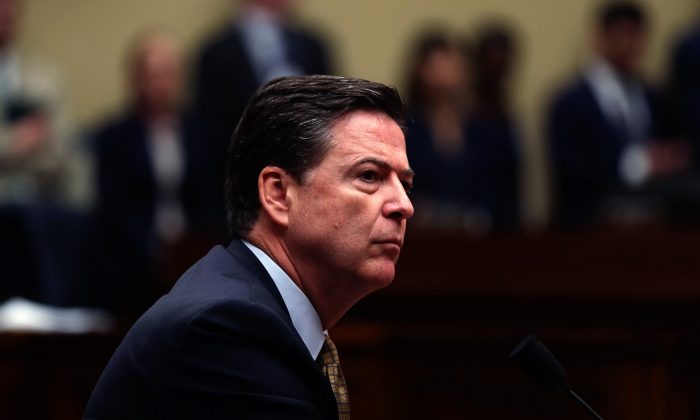As former FBI Director James Comey heads to Washington to testify before the House committees on Friday, Dec. 7, a former FBI agent said this may create a “promising” opportunity for the FBI to reopen the investigation on Hillary Clinton’s use of unauthorized email server, or for the Justice Department (DOJ) to initiate one.
Comey announced on Dec. 3, through his attorney, that he will testify, under a set of preconditions, before the House Judiciary Committee and the House Committee on Oversight and Government Reform.
The committees agreed to provide Comey with a transcript of his testimony within 24 hours and the ex-FBI head will be free to share the transcript and discuss his testimony, Comey’s attorney David Kelley told the Epoch Times.
A subpoena has also been sent to the former Attorney General Loretta Lynch.
Since October 2017, the committees have been investigating actions taken by the FBI and DOJ during their investigation into the Clinton email probe along with actions taken in relation to the investigation of the Trump campaign and related matters.
The subpoenas for Comey and Lynch mark the final stage of committees’ investigation.
Marc Ruskin, a former FBI undercover agent who spent 27 years with the bureau, suggested that Comey’s coming testimony is a promising chance if the House lawmakers ask the right questions.
“The House members should ask specific, direct, and probing questions as to how the investigation had been conducted and who made the decisions, and why, leading up to the July 5 statement,” he said, referring to Comey’s surprise exoneration of Hillary Clinton in July 2016.

It also depends on Comey’s answers, he added.
“If Comey testifies under oath, lying to Congress under oath is the crime of perjury,” he added.
Who Made the ‘Careless’ Decision?
On July 5, 2016, in a statement from the FBI, Comey concluded that Clinton’s handling of classified information via an unauthorized private email server was “extremely careless,” suggesting the DOJ file “no charge” for Clinton.
“Although we did not find clear evidence that Secretary Clinton or her colleagues intended to violate laws governing the handling of classified information, there is evidence that they were extremely careless in their handling of very sensitive, highly classified information,” Comey said in a statement back in July 2016.
Comey’s statement, which had originally included the criminal term “grossly negligent,” was edited down by former FBI agent Peter Strzok to “extremely careless,” eliminating a key phrase that could have had legal ramifications for Clinton.
Comey then concluded suggesting, “Although there is evidence of potential violations of the statutes regarding the handling of classified information, our judgment is that no reasonable prosecutor would bring such a case.”
Ruskin said Comey’s toning down from what was criminal to “careless” in his statement was “unprecedented” because the FBI is responsible for preparing the report, while the decision to charge is up to the DOJ or a grand jury.
“My opinion is the White House did not want the attorney general to make the announcement that Clinton would not be prosecuted, as the decision would appear to be politically motivated,” he said. “So they pressured Comey to do it, thus exceeding the traditional limitations on the role of the FBI.”
In a Feb 2018 report by the chairman of the Senate Homeland Security and Governmental Affairs Committee (pdf), Sen. Ron Johnson (R-Wis.) has suggested that a text message between Strzok and his mistress, FBI lawyer Lisa Page, raised “additional questions about the type and extent of President Obama’s personal involvement in the Clinton email scandal and the FBI investigation of it.”
On a Sept. 2, 2016, text exchange, Page said that she was preparing the talking points because “potus [President of the United States] wants to know everything we’re doing.”


